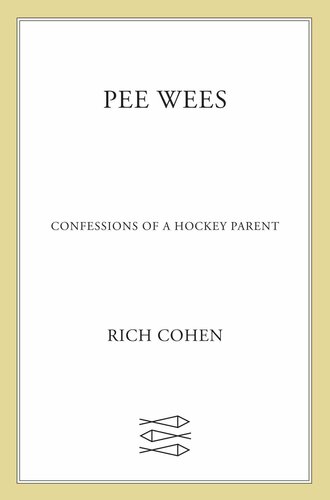
Pee Wees
Confessions of a Hockey Parent
- اطلاعات
- نقد و بررسی
- دیدگاه کاربران
نقد و بررسی

October 19, 2020
Memoirist Cohen (Sweet and Low) scores with this heartfelt account of watching—and agonizing over—his 11-year-old son’s season playing kids’ competitive hockey. Starting with April tryouts and ending with a soul-churning state tournament in March, Cohen provides a fascinating glimpse into the players’ egos and excels in profiling the parents and coaches who live and die with each shift in their children’s fortunes (“Coach Hendrix... poured all his anger and disappointment on me—the fact that he’d not been able to play hockey as a kid, the fact that his older daughter had quit and his younger daughter had not made Double A”). The author is not immune. His son Micah’s role on the team changes as the season unfolds, but Cohen, who ends up seeing a cardiologist due to stress from watching the games, is the one who’s most affected. “I knew I had lost perspective,” he observes after enduring the drama of tryouts. “I knew none of it mattered.” Sports parents will find an empathetic ally in Cohen, whose lean and lyrical prose covers the action on the ice and in his heart. “You want what’s best for your kid,” he writes, “but who even knows what that is? Maybe it’s succeeding in hockey, maybe it’s failing.” Cohen’s soulful, poignant examination is a winning testament to the ways parents often live for—and through—their children.

November 15, 2020
An exploration of the hypercompetitive world of youth hockey. Cohen's latest, a mashup of memoir, The Mighty Ducks, and The Bad News Bears, is as much about the irrational, overbearing behavior of parents as it is about the kids who play the sport. If the author's heartfelt, often brutally funny depiction of peewee hockey is accurate, then soccer moms and baseball dads have nothing on the frighteningly obsessive mania of hockey parents. Cohen ushers readers into a hockey-obsessed corner of the country, Fairfield County, Connecticut, where his adolescent son plays on a peewee team consisting of a mix of boys and girls ages 11 and 12. The author shows us a youth league system so ruthlessly competitive that it divides the players into a hockey hierarchy that consists of four different skill levels: AA, A1, A, B. Of course, with each level comes a corresponding social status for both parent and child. "If a kid who's been on single A slips to B," writes Cohen, "he will be ostracized, his parents cast out. If you talk to them, it's the way you talk to a formerly rich man who has lost everything." We follow Cohen through the ups and (mostly) downs of one season as experienced from the unique perspective of a dedicated hockey dad: the constant travel, the sociopathic hockey parents, and, for his son's Ridgefield Bears, many losses. Though the author, who clearly loves the sport, revels in his comic observations of his son's experiences on the ice, there is a note of serious lament about the overall state of the game as it's played now. For Cohen, hockey in America has become something of a lost cause, mainly because self-interested adults remake the sport "in the image of the grown-up world." An alternately charming and acerbic portrait of another youth sport spoiled by adults.
COPYRIGHT(2020) Kirkus Reviews, ALL RIGHTS RESERVED.

December 18, 2020
Journalist Cohen writes about his own firsthand experiences in the competitive world of youth sports as the father of a young hockey player in Connecticut. Cohen, a former hockey player himself, chronicles the fortunes of his son Micah as he accompanies him "on the road" from April tryouts to the State competition the following March. The youth hockey season consists of 50 games that ends in a state tournament. Getting on a team is extremely competitive; approximately 200 young adults go to tryouts, and only 70 will be offered a spot on the team. Cohen discusses how the status of a parent in the group depends of the performance of their children ("when your kid excels, you are treated better"). He also recounts his attendance at a mandatory counseling session for hockey parents, where they are strongly advised not to curse in the stands, heckle or challenge referees, or accept cash gifts, among others. The losses and wins are vividly recounted along with the camaraderie of teammates and their parents--as well as disputes, rivalries, and jealousies. VERDICT A fascinating look at hockey culture that also offers insight into the competitiveness of youth sports.--Lucy Heckman, St. John's Univ. Lib., Queens Village, NY
Copyright 2020 Library Journal, LLC Used with permission.




دیدگاه کاربران